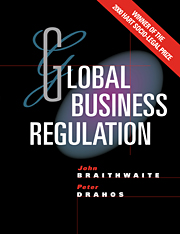11 - Labour Standards
Published online by Cambridge University Press: 04 August 2020
Summary
History of Globalization
The Regulation and Abolition of Slavery
The first globalizing movement in the regulation of labour culminated in rather detailed rules in Justinian's Code (issued progressively through the sixth century AD) and earlier in the Theodosian Code (438 AD). This regulation was of fundamental importance, as Engels pointed out in Anti-Duhring:
It was slavery that first made possible the division of labour between agriculture and industry on a larger scale, and thereby also Hellenism, the flowering of the ancient world. Without slavery, no Greek state, no Greek art and science; without slavery, no Roman empire. But without the basis laid by Hellenism and the Roman empire, also no modern Europe (Marx & Engels 1987, Vol. 25: 168).
Perhaps even more Eurocentric than Engels, given the significance of both ancient Chinese slavery and politics, is RihiU's (1996: 111) extravagant claim:
Ancient Greece was the first genuine slave society, and also the first political society. This was not coincidental. But slaves did not simply allow the classical Greeks the leisure time to participate in politics; rather, and much more significantly, the growth of slavery in the archaic period prompted the Greeks to invent politics.
Under Roman law even medicine did not attain the status of a ‘liberal profession': Justinian's Code legislated medicine as unbefitting free men; the profession incubated under a regime of slave-physicians (Finley 1980: 106-7). Justinian's Code ‘provided a finely worked instrument for Byzantine administration throughout the Middle Ages’ (Phillips 1985: 38). When the Visigoths overran Spain in the early Middle Ages, ‘they took over into their vulgar version of Roman law many provisions pertaining to slavery’ (Finley 1980:124). Slavery declined during the Middle Ages in Europe if not in the Islamic world (Phillips 1996: 78), though Justinian's systematization remained ready to be invoked, ‘a sophisticated legal code with elaborate rules for operating [a slave system]’ (Phillips 1985: 39). While feudal serfdom - an alternative form of legally enforceable unwaged part-time labour for a lord and master - more or less replaced the slave system (Bonnassie 1991), pockets remained. In England in 1086 still 9 per cent of the population were classified as slaves (Eltis 1993: 208).
- Type
- Chapter
- Information
- Global Business Regulation , pp. 222 - 255Publisher: Cambridge University PressPrint publication year: 2000



